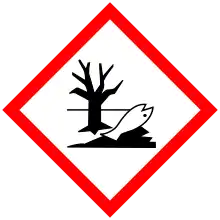| Names | |
|---|---|
| Other names
Rhuthenium trinitrate, Ruthenium nitrate | |
| Identifiers | |
3D model (JSmol) |
|
| ChemSpider | |
| ECHA InfoCard | 100.036.279 |
| EC Number |
|
PubChem CID |
|
CompTox Dashboard (EPA) |
|
| |
| |
| Properties | |
| Ru(NO3)3 | |
| Molar mass | 287.1 |
| Appearance | Yellow crystals (hydrate) |
| Soluble | |
| Hazards | |
| GHS labelling: | |
    | |
| Danger | |
| H272, H302, H317, H318, H411 | |
| P210, P220, P221, P261, P264, P270, P272, P273, P280, P301+P312, P302+P352, P305+P351+P338, P310, P321, P330, P333+P313, P363, P370+P378, P391, P501 | |
| Related compounds | |
Related compounds |
Americium(III) nitrate, Einsteinium(III) nitrate |
Except where otherwise noted, data are given for materials in their standard state (at 25 °C [77 °F], 100 kPa).
Infobox references | |
Ruthenium(III) nitrate is an inorganic compound, a salt of ruthenium and nitric acid with the chemical formula Ru(NO3)3.[1][2]
Physical properties
Ruthenium(III) nitrate dissolves in water. It forms a crystalline hydrate with the composition Ru(NO3)3·6H2O in the form of yellow crystals.
Chemical properties
Ruthenium(III) nitrate reacts with silicon oxide in a carbon monoxide atmosphere to form Ru(CO)2(OSi)2, Ru(CO)3(OSi)2, or Ru3(CO)12.[3]
Applications
Ruthenium(III) nitrate is used for the manufacture of ruthenium-carbon catalysts.[4]
References
- ↑ "Ruthenium Nitrate". American Elements. Retrieved 21 August 2021.
- ↑ Becker, Harry; Dalpe, Claude; Walker, Richard J. (29 May 2002). "High-precision Ru isotopic measurements by multi-collector ICP-MS". The Analyst. 127 (6): 775–780. Bibcode:2002Ana...127..775B. doi:10.1039/b200596d. PMID 12146910.
- ↑ Huang, Lin; Xu, Yide (November 2001). "Surface-mediated reductive carbonylation of SiO2-supported RuCl3 and Ru(NO)(NO3)3 studied by IR spectroscopy". Journal of Molecular Catalysis A: Chemical. 176 (1–2): 267–280. doi:10.1016/S1381-1169(01)00267-9. Retrieved August 21, 2021.
- ↑ Kawaguchi, T; Sugimoto, W; Murakami, Y; Takasu, Y (1 January 2005). "Particle growth behavior of carbon-supported Pt, Ru, PtRu catalysts prepared by an impregnation reductive-pyrolysis method for direct methanol fuel cell anodes". Journal of Catalysis. 229 (1): 176–184. doi:10.1016/j.jcat.2004.10.020. ISSN 0021-9517. Retrieved 21 August 2021.
This article is issued from Wikipedia. The text is licensed under Creative Commons - Attribution - Sharealike. Additional terms may apply for the media files.